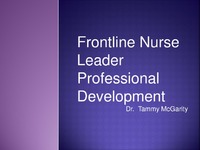| dc.contributor.author | Franqueiro, Tammy | en |
| dc.date.accessioned | 2016-03-21T16:50:09Z | en |
| dc.date.available | 2016-03-21T16:50:09Z | en |
| dc.date.issued | 2016-03-21 | en |
| dc.identifier | CONV15C15 | en |
| dc.identifier.uri | http://hdl.handle.net/10755/603414 | |
| dc.description | 43rd Biennial Convention 2015 Theme: Serve Locally, Transform Regionally, Lead Globally.` | en |
| dc.description.abstract | Session presented on Sunday, November 8, 2015: This session provides an overview of processes, models, and effective design principles that were foundational in developing a successful residency program. In 1999, the residency development team used a DACUM process for initial role delineation. The results, along with Benner's (1984) Novice to Expert framework, provided the initial structure of the program. Presenters will describe how core and specialty competencies and supporting curricula have been identified and developed. As a competency-based program, the Competency Outcomes Performance Assessment (COPA) Model is used as a framework to identify and develop essential competencies needed for clinical practice. These competencies are then organized into categories and performance criteria using Quality & Safety Education for Nurses (Cronenwett, Sherwood, & Gelmon, 2009 ) as a framework and statement of objective. To ensure currency and relevance competency and curricula development also rely on national professional nursing organization scope and standards of practice.The education and development of the interprofessional team is another key aspect of the residency described in this section. Subject matter experts, preceptors, mentors and debriefers are critical to the long term success of the program and have their own unique learning needs. The presentation will outline the education and support needed for these roles. Lastly, a description of practice-based learning will depict tools and strategies used to support the residents learning experiences at the point of care for it is when working directly with patients and their families that learning takes place (Benner, Hooper-Kyriakidis, & Stannard, 2011). Both initial and ongoing competency management are important aspects of the program. For residency stakeholders having the tools, support, and resources they need to support learning is essential for professional role development and the provision of safe patient-centered care. | en |
| dc.format | Text-based Document | en |
| dc.language.iso | en_US | en |
| dc.subject | Residency | en |
| dc.subject | competency development | en |
| dc.subject | program design | en |
| dc.title | Residency Development, Design, and Implementation | en |
| dc.title.alternative | RNs in Transition: From Concept to Practice [Symposium] | en |
| dc.type | Presentation | en |
| dc.rights.holder | <p>
All rights reserved by the author(s) and/or publisher(s) listed in this item record unless relinquished in whole or part by a rights notation or a Creative Commons License present in this item record.
</p><p>
All permission requests should be directed accordingly and not to the Sigma Repository.
</p><p>
All submitting authors or publishers have affirmed that when using material in their work where they do not own copyright, they have obtained permission of the copyright holder prior to submission and the rights holder has been acknowledged as necessary.
</p> | |
| dc.description.note | Items submitted to a conference/event were evaluated/peer-reviewed at the time of abstract submission to the event. No other peer-review was provided prior to submission to the Henderson Repository, unless otherwise noted. | |
| dc.type.category | Full-text | en |
| dc.contributor.department | Alpha Alpha | en |
| dc.author.details | Tammy Franqueiro, RN, RN-BC | en |
| dc.conference.name | 43rd Biennial Convention | en |
| dc.conference.host | Sigma Theta Tau International, the Honor Society of Nursing | en |
| dc.conference.location | Las Vegas, Nevada, USA | en |
| dc.date.conferenceyear | 2015 | en_US |
| dc.description.reviewtype | Abstract Review Only: Reviewed by Event Host | en |
| dc.description.acquisition | Proxy-submission | en |





